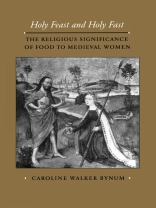In the period between 1200 and 1500 in western Europe, a number of religious women gained widespread veneration and even canonization as saints for their extraordinary devotion to the Christian eucharist, supernatural multiplications of food and drink, and miracles of bodily manipulation, including stigmata and inedia (living without eating). The occurrence of such phenomena sheds much light on the nature of medieval society and medieval religion. It also forms a chapter in the history of women.
Previous scholars have occasionally noted the various phenomena in isolation from each other and have sometimes applied modern medical or psychological theories to them. Using materials based on saints’ lives and the religious and mystical writings of medieval women and men, Caroline Walker Bynum uncovers the pattern lying behind these aspects of women’s religiosity and behind the fascination men and women felt for such miracles and devotional practices. She argues that food lies at the heart of much of women’s piety. Women renounced ordinary food through fasting in order to prepare for receiving extraordinary food in the eucharist. They also offered themselves as food in miracles of feeding and bodily manipulation.
Providing both functionalist and phenomenological explanations, Bynum explores the ways in which food practices enabled women to exert control within the family and to define their religious vocations. She also describes what women meant by seeing their own bodies and God’s body as food and what men meant when they too associated women with food and flesh. The author’s interpretation of women’s piety offers a new view of the nature of medieval asceticism and, drawing upon both anthropology and feminist theory, she illuminates the distinctive features of women’s use of symbols. Rejecting presentist interpretations of women as exploited or masochistic, she shows the power and creativity of women’s writing and women’s lives.
Cuprins
Foreword
Note on the Text
Author’s Note
The Boston Poems
Cups 1-12
The Park
The Faerie Queene
The Moth Poem
Image-Nations -4
Les Chiméres
Charms
Great Companion: Pindar
Image-Nations 5-14 and Uncollected Poems
Streams I
Syntax
Pell Mell
Great Companion: Robert Duncan
Streams II
Exody
Notes
Great Companion: Dante Alighiere
Wanders
So
Oh!
Afterword
Index of Titles and First Lines
Despre autor
Caroline Walker Bynum is Western Medieval History Professor Emerita School of Historical Studies at the Institute for Advanced Study.












